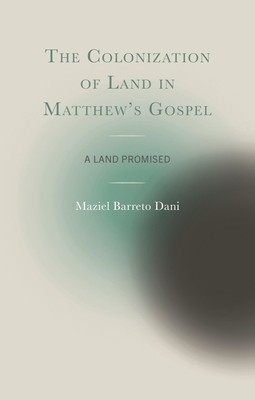
- We will send in 10–14 business days.
- Author: Maziel Dani
- Publisher: FORTRESS ACADEMIC
- ISBN-10: 1978710321
- ISBN-13: 9781978710320
- Format: 15.2 x 22.9 x 1.8 cm, kieti viršeliai
- Language: English
- SAVE -10% with code: EXTRA
Reviews
Description
In The Colonization of Land in Matthew's Gospel, Maziel Barreto Dani proposes that land is constructed as a colonized and subjugated entity in Matthew's gospel. Traditional scholarship claims that the Gospel of Matthew is detached from spatial-territorial discussions and that geographical land concerns are displaced with Christology. Dani, however, reinterprets multiple implicit and explicit references to land in the Gospel to show continuity, rather than discontinuity, with the Hebrew Bible's concerns with material land promises. She does so by engaging the Gospel within its broader Roman, Hellenistic, and Jewish contexts where the theme of land possession is pervasive. Central to the Gospels and the imperial contexts from which it emerges are contestations over the land and proclamations to whom the land belongs. Dani argues that while Judea and neighboring lands are under the firm control of Roman imperial power during the first century CE, Matthew's Gospel envisions Rome's demise and the control of land being transferred to an alternative empire governed by the sovereign rule of God.Though God liberates the land from Rome's oppressive grasp and restores land promises to the righteous poor at Jesus' return, the land fails to escape colonial control. That is, the world while relinquished from Roman hegemony is reasserted under God's power and domination. In arguing that Matthew's Gospel employs an imperializing agenda involving land reclamation, the Gospel may be a source for validating and justifying the modern colonization of foreign and occupied land under the guise of God's purposes. The Colonization of Land in Matthew's Gospel challenges colonial ideologies which oppress not only peoples but the lands which they inhabit.
EXTRA 10 % discount with code: EXTRA
The promotion ends in 22d.20:39:23
The discount code is valid when purchasing from 10 €. Discounts do not stack.
- Author: Maziel Dani
- Publisher: FORTRESS ACADEMIC
- ISBN-10: 1978710321
- ISBN-13: 9781978710320
- Format: 15.2 x 22.9 x 1.8 cm, kieti viršeliai
- Language: English English
In The Colonization of Land in Matthew's Gospel, Maziel Barreto Dani proposes that land is constructed as a colonized and subjugated entity in Matthew's gospel. Traditional scholarship claims that the Gospel of Matthew is detached from spatial-territorial discussions and that geographical land concerns are displaced with Christology. Dani, however, reinterprets multiple implicit and explicit references to land in the Gospel to show continuity, rather than discontinuity, with the Hebrew Bible's concerns with material land promises. She does so by engaging the Gospel within its broader Roman, Hellenistic, and Jewish contexts where the theme of land possession is pervasive. Central to the Gospels and the imperial contexts from which it emerges are contestations over the land and proclamations to whom the land belongs. Dani argues that while Judea and neighboring lands are under the firm control of Roman imperial power during the first century CE, Matthew's Gospel envisions Rome's demise and the control of land being transferred to an alternative empire governed by the sovereign rule of God.Though God liberates the land from Rome's oppressive grasp and restores land promises to the righteous poor at Jesus' return, the land fails to escape colonial control. That is, the world while relinquished from Roman hegemony is reasserted under God's power and domination. In arguing that Matthew's Gospel employs an imperializing agenda involving land reclamation, the Gospel may be a source for validating and justifying the modern colonization of foreign and occupied land under the guise of God's purposes. The Colonization of Land in Matthew's Gospel challenges colonial ideologies which oppress not only peoples but the lands which they inhabit.


Reviews